Come let us bury Rugby Year 2023. Wallabus Annus Horribilis began with great promise. Let us be more precise: January began with a great number of promises by Eddie ‘Sumasshu Gurabu’ Jones.
He was indeed unbeaten when February began, making January the apex of the Australian rugby year. This columnist may not tip Super Rugby Pacific very well lately, but kept up with the Jones tragicomedy quite well, predicting the whole bloody mess with precision, missing only the failure to emerge from the pool, which still beggars belief.
Every single month got worse for the infirm firm of Jones & McLennan, until the dismal confirmation of his disinterest in the long haul Wallaby dream.
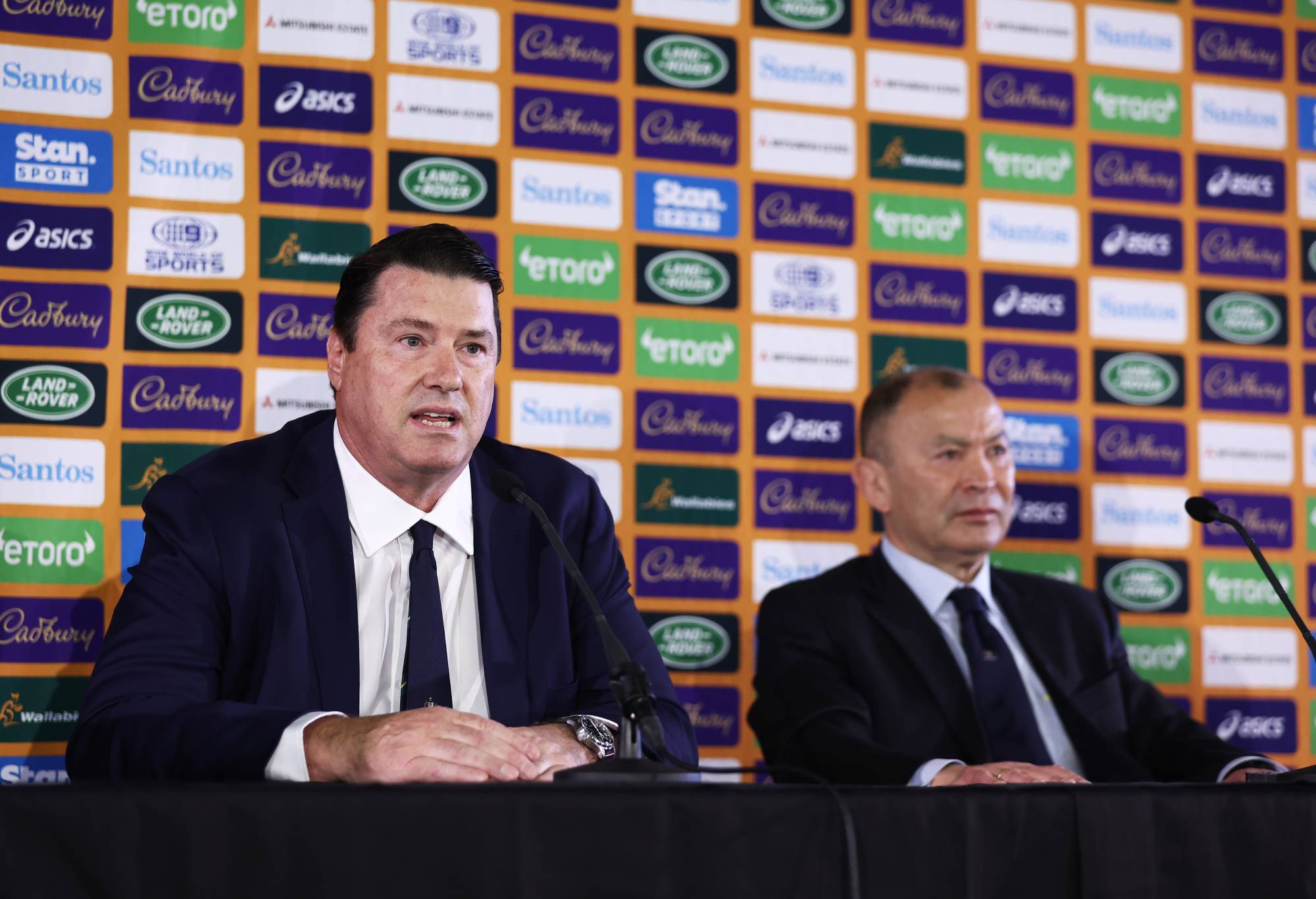
Rugby Australia chairman Hamish McLennan with Wallabies coach Eddie Jones. (Photo by Matt King/Getty Images)
First, the irrational boasts. Then, odd selections, followed by plans in The Rugby Championship which rendered veterans veritable tackling crash Test dummies, until a few broke down. Then, pugilism with the press, and outright disrespect towards stalwart players who were spurned whilst project players who may not even be around in 2027 were led like lambs to a Lyon slaughter. Finally, the awkward waltz towards Tokyo.
Whispers to me all along had placed him in Japan in 2024; credible voices but hushed.
Meanwhile, in Wales, it was the nearly the nadir, with money gone and spent or lost in pockets we will never find, players in a mood to strike or worse, and a dreary return to Warrenball on tap.
It was the year of the Coach Redux: the extraordinary Jones back to his roots, ready to root a journo, the truth, and rugby role models; Warren Gatland paring back Welsh ambition and attack and sticking the ball up Dan Biggar’s jumper in order to escape Pool C (plot reveal twist: by the end of the year he was bemoaning how dull rugby was growing) and flip the script.
Love the rugby on Stan? Check out every Australian Open match ad-free, live and on demand with centre court action in 4K Ultra-HD on the home of Grand Slam tennis, Stan Sport.
Similarly, Steve Borthwick brought basics back to England for the Six Nations without great effect, muddled about in the preparation Tests, and then rode a shallow Pool D into the semis, just lacking an impact reserve front row; the Sweet Chariot going into reverse at just the wrong time.
If old was gold for Gatland and Borthwick, Rassie Erasmus and Jacques Nienaber assented, preserving grumpy old men Willie le Roux and Duane Vermeulen over and above domestic protest, but letting Frans Steyn go in favour of Damian Willemse, just as Gatland did with his Old Guard captain, installing the perfect successor in Jac Morgan.
Early in the year, referees warned online and in-person abuse was spiking and needed attention. No effective legal tool exists to curb the tiny portion of humanity who feels the urge to threaten officials and their families, especially if they maintain public media accounts; almost every attempt will end in futility. A famous ref making huge calls affecting millions of fans: all of them connected on various platforms. There is precious little which will curb the words of a few. But shame and disgust and cultural insistence on better behaviour can have a moderating influence.
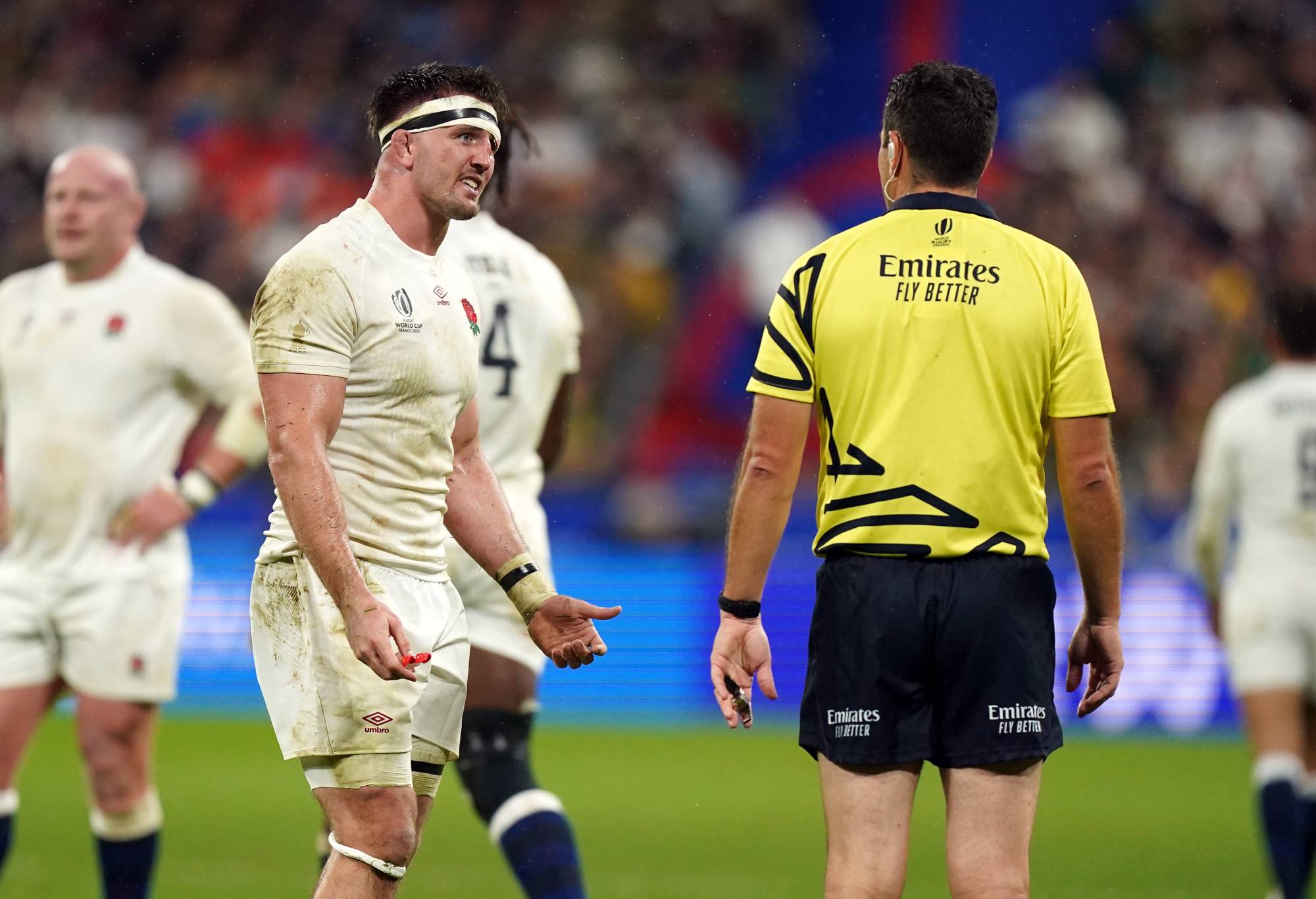
England’s Tom Curry speaks to referee Ben O’Keeffe during the Rugby World Cup semi final. (Photo by Mike Egerton/PA Images via Getty Images)
Still, one of the lowest lows of the year was the deafening and sustained boos in the rain of Ben O’Keeffe by French ‘neutrals’ who once they lost, also lost their facade of hospitality. This was topped by the reception given the consensus ‘best ref in the world’ (Wayne Barnes) by some after an extremely complex final match.
A low in World Rugby was their leak to a French news outlet of ‘five major errors’ in the brilliant O’Keeffe quarterfinal which ousted the hosts; the actual verdict was there were five ‘material’ errors, which is actually a small number compared to the average Test match, and not only did they stack 3-2, some cancelled out others.
Yet World Rugby never caught their leaker, preferring instead to use their energy going after rugby influencers for daring to publish video or gifs of games they (or someone) had likely paid thousands to attend.
But a high: the interest in rugby as a whole. Not everywhere. But in the second tier, culminating in a glorious display of courage at the Big Dance. The coach of the year, in my book, foodie Simon Raiwalui, made Fiji state its claim to be forever seen as tier one, but others took a step back.
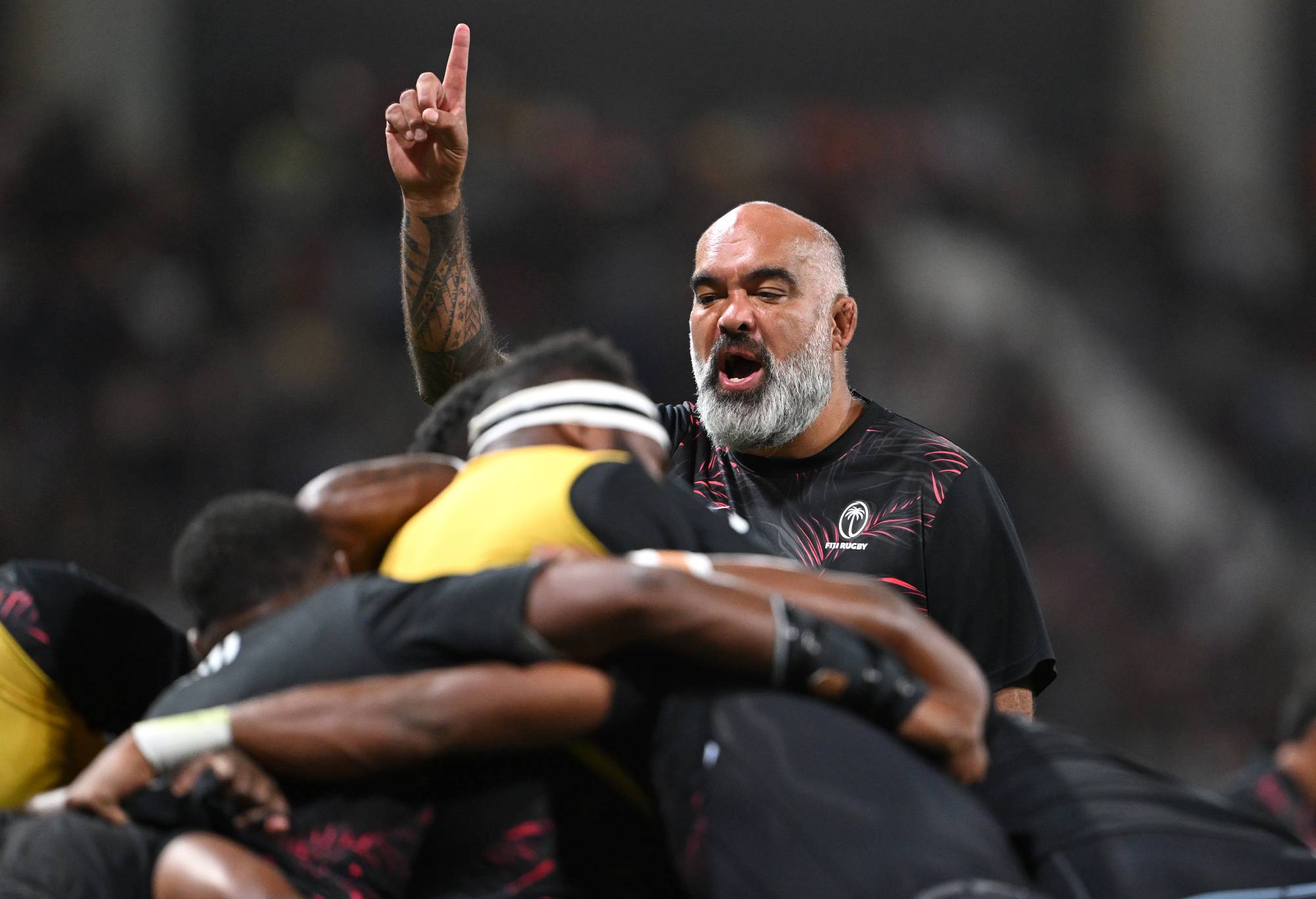
Simon Raiwalui. (Photo by Stu Forster/Getty Images)
Portugal, along with several other rising nations, showed the world how brave and brilliant rugby can look when it combines modern tactics and fitness with old school verve and a bit of rugby madness.
The United States failed to qualify, and were forced to watch teams like Chile and Romania enjoy the banquet; the backdrop of 2031 looms ever closer. More lows came when teams were dropped for financial reasons from MLR, even a recent champion. Still, one must applaud the league for having real standards and audits, which may prevent the terrible sights of London Irish and other teams disbanded after slow descents.
Meanwhile, French rugby continues to burn cash like there is no tomorrow. A low in that land was the conviction (on appeal) of Bernard Laporte and other French rugby dignitaries. MLR may be slow to build, but it is vital to prune bad bets earlier than later.
An early high of 2023 was the Grandest of Slams by Ireland. I was happy to see the coup de grace achieved in Dublin, where day turned to night and back to day without cessation of drink.
Once again, the home side won the penalty count; all tournament, Ireland averaged less than nine penalties a match, a figure the Wallabies dream and drool over.
The silky-sextant greens did not look like losing any of their five Tests en route to the most conclusive domination in a century. The Two Nation race which the Six Nations has devolved into lately was just One.
Johnny Sexton led on the field, whilst Garry Ringrose led the craic the week after, with just a small worry about whether that crown would detract from the big one later in the year.
Despite lofty achievements the envy of almost every player, Sexton ran afoul of the refs at club level in a portent of the Cup melodrama, and only a clever fixture in Portugal allowed the legend to take his place on time in France.
Meanwhile, our sport turned a corner on how we think of and accept mental health needs, with uber-competitive Owen Farrell saying what he needs: a break from Test football. As we bemoan the ease with which deranged dolts can direct message a ref, we should also give ourselves a pat on the back for how little guff Farrell took for doing what he felt was right for himself and his family.
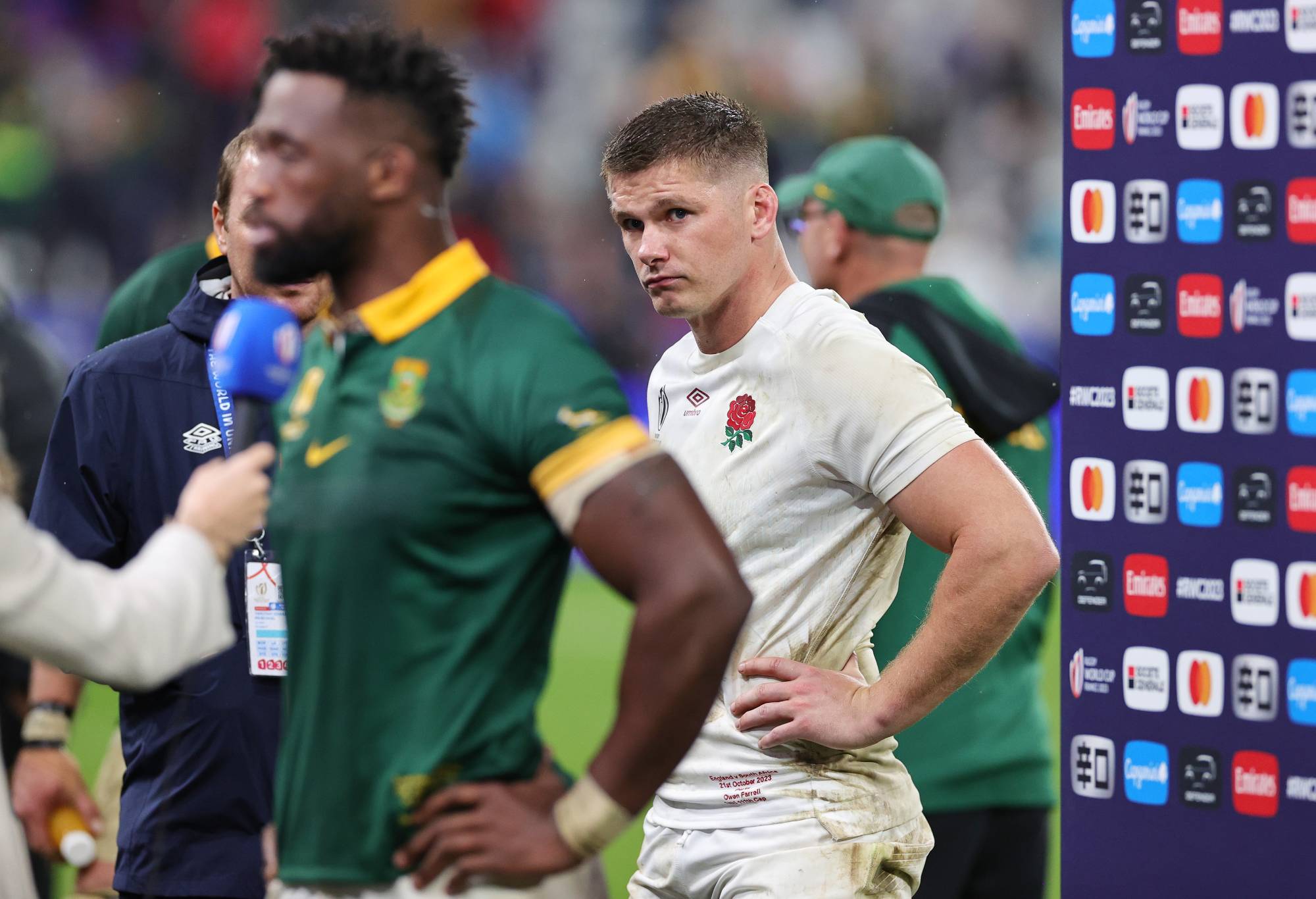
Owen Farrell . (Photo by David Rogers/Getty Images)
Other global sports like soccer and basketball seldom handle either of those issues as well as rugby.
Not to diminish mental scarring, but the scarring of the brain itself was front and centre this year.
Class and collective actions are gaining momentum. World Rugby seems to be focused on tackle height and in-match cards as the fulcrums of showing adequate care and appropriate action.
A low was the incoherent and ad hoc way many cards were decided and upheld or reversed. A high was the way most players reacted anyway: the very best teams seemed the very best at playing low enough. When Ireland beat the Springboks in Pool B in Paris, the match was as brilliantly brutal as any in history, but both teams set the standard for low penalty count and clean approaches to the contact zone.
In general, the Irish are playing a game from schools to international which features exquisite passing and kicking, with an eye to the ball beating the man, rather than man bashing man.
In their Grand Slam, Ireland kept the ball within five metres of the previous ruck far more than others (55 percent of the time), thereby building more cleaned rucks, and then narrowed their attack in the red zone to defeat pilfer attempts.
The problem is both Ireland and Leinster failed yet again this year at the highest hurdles, which makes us all wonder if their style of beautiful keep-the-ball-in-play can win five knockouts in a row or survive the most physical teams when it counts the most.
By the end of the World Cup, New Zealand looked like the All Blacks of old, minus one authoritative general and a proper 12. Their low was London, their high Mount Smart, and in Paris, they looked a bit closer to the latter than the former, but not close enough.
The Boks took down France in one of the greatest matches I have ever seen live; thrilling, wild, and I felt literally high afterwards.
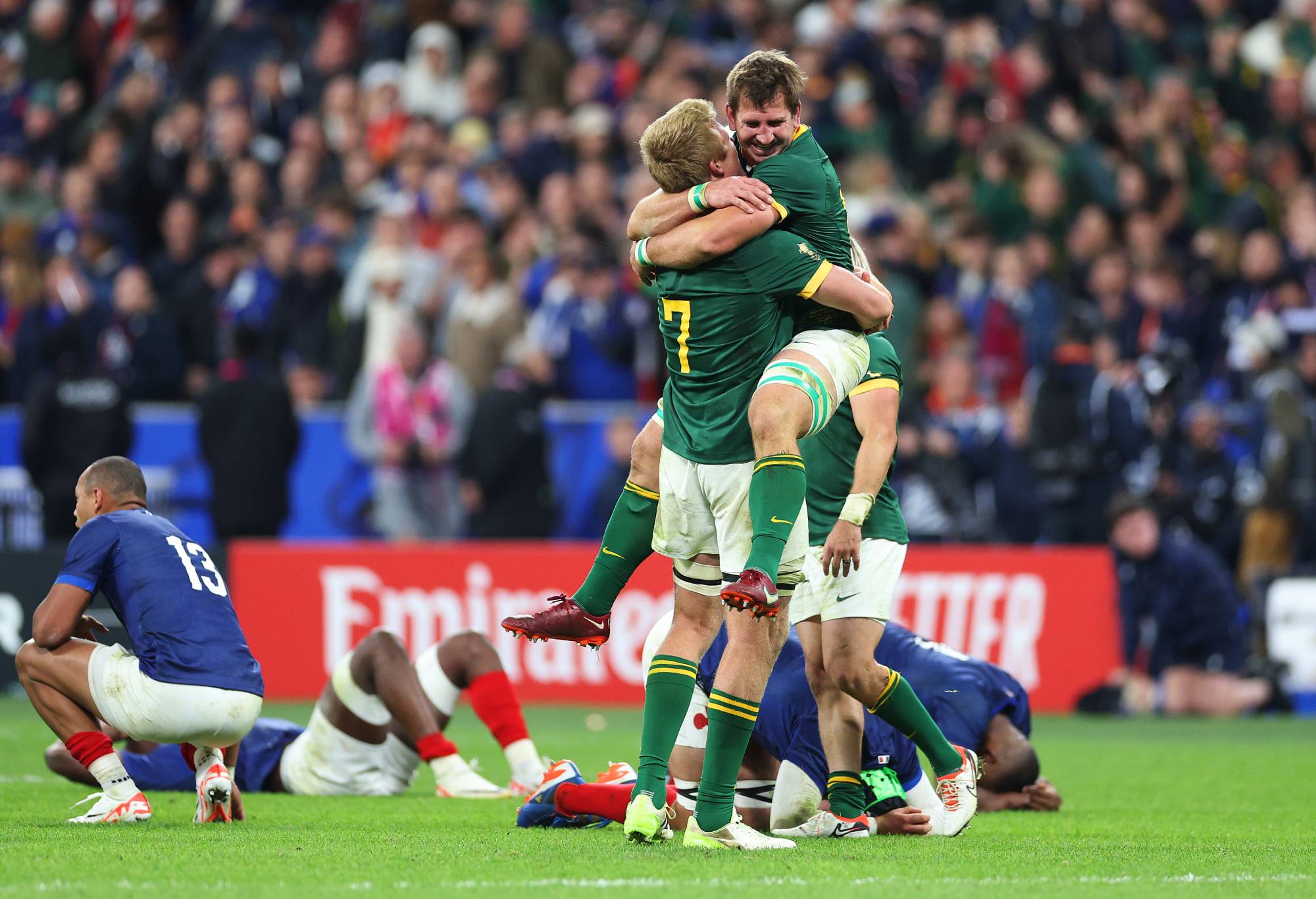
Springboks Pieter-Steph Du Toit and Kwagga Smith celebrate victory in their Quarter Final against France. (Photo by Warren Little/Getty Images)
The final itself was a grim affair, as finals tend to be, but the high was the emotion of the win and all it means for the beloved country of battered dreams.
A tactical high was tap-and-go or tap-and-rumble for deep red zone penalties, rather than the boot to five and an uncertain and risky throw-catch-transfer-maul all the time. Take the tap cleanly and have the right carrier with a lawful latch wingman and you are almost guaranteed a ruck within one or two steps of the tryline with quick reload.
A strategic high was the Springbok rotation and bench thinking, which kept foes off balance, and depended not on beef as much as brilliant light hybrids and ultra fit halfbacks.
A monumental low was the symbolism of the Wallabies’ highest performing back, Mark Nawaqanitawase switching codes; but perhaps the lower low was a wing being the best back for Australia at the Cup, when they really needed a nine-ten combination to set up one of the best No.12s in the world. The Wallabies were only better than one other team at getting the ball past second receiver. Their wings were reduced to making something out of nothing.
Overall, the highs in rugby were higher than the lows were low, except in the country base of The Roar.
What comes next?
The All Blacks seek a new lock; Boks need another Jacques.
The Irish need a new flyhalf; France will just eat a fatted calf.
England imagine life after Owen; Australia might sign Ronan.
Wales needs cash; Scotland cannae avoid the looming crash.
Georgia was the new Italy; until Portugal played so brilliantly.
Fiji can climb any hill; Japan now has hired Coach Thrill.

































































































